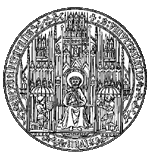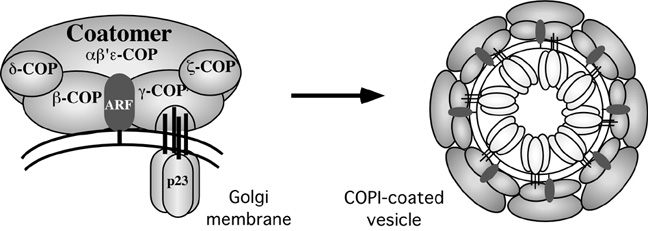
| |
Felix Wieland
- 1968-1973 Study of chemistry at the University of Munich
- 1974-1978 Diploma and PhD Student at the Max Planck-Institut für Biochemie, Munich
- 1976-1978 Research assistant at the Max-Planck-Institut für Biochemie, Munich
- 1984 Habilitation in Biochemistry
- 1984-1986 Senior research assistant at the University of Regensburg
- 1986-1988 Visiting scientist at the Department of
- Biochemistry, Stanford University, USA
- 1988-1996 C4 Professor at Heidelberg University, Faculties of Medicine and Biology, Chair of Biochemistry Institute I
- 1997 Chair of Biochemie-Zentrum Heidelberg (BZH)
- Contact:
- Felix Wieland, Universität Heidelberg, Biochemie-Zentrum (BZH),
- Im Neuenheimer Feld 328
- D-69120 Heidelberg,
- Tel. +49-6221-544150
- Fax: +49-6221-544366,
- e-mail: felix.wieland@urz.uni-heidelberg.de
Biogenesis Of Transport Vesicles
Current Research
The last step in the biosynthesis of membrane proteins and secreted proteins is vesicular transport to their destinations. Likewise, many membrane lipids are transported in vesicles. My lab focuses on the characterization of COPI-coated vesicles that are involved in anterograde and retrograde protein transport in the early secretory pathway of eukaryotic cells. In the past we have characterized a variety of protein components of the machinery used for the generation of COPI-coated vesicles. In addition, we have determined the rate at which these vesicles travel through the cell. Recently we have characterized a coat-receptor protein in the membrane of COPI-coated vesicles and shown that coat recruitment involves a bivalent interaction of coatomer with the donor membrane. These minimal requirements for the formation of a COPI-vesicle we have confirmed in a chemically defined in vitro system. In addition we have observed a segregation of membrane lipids from COPI-vesicles.
Projects for a doctoral thesis
For the next couple of years our research will focus on the molecular mechanisms of COPI-vesicle generation. We will analyse both the mechanisms that allow cargo to be included and resident Golgi proteins to be excluded from a forming vesicle, and the sorting of membrane Lipids. The methods applied will include in vivo and in vitro transport assays, protein chemistry, molecular biology, ultra structural analysis of cells and isolated organelles, as well as lipid biochemistry.
Our long term goal is to elucidate at a molecular level the functional organization of the endomembrane system with respect to biosynthesis and specific transport of proteins and lipids.

